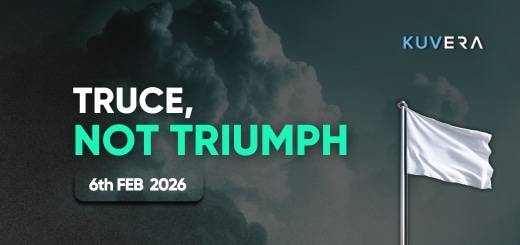In this edition, we talk about the growing action in India’s FMCG sector with the likes of Reliance, Tata and Adani groups preparing to take on biggies like HUL and Nestle. We also talk about India’s economic growth as well as the latest developments related to SEBI chief Madhabi Puri Buch and the IPO market.
Welcome to Kuvera’s weekly digest on the most critical developments related to business, finance, and the markets.
tl;dr Hear the article in brief instead?

A hundred and fifty years ago, in 1884 to be precise, a family grocery store in northern England began selling packaged and branded soap bars. Four years later, the Sunlight soap bars were imported into India. Over the next years and decades, the company behind Sunlight introduced more brands—Lifebuoy, Pears, Lux, Vim, Vanaspati and the famous Dalda.
No points for guessing that company’s name. Yes, it was Unilever. The British fast-moving consumer goods giant set up its first Indian subsidiary in 1931 and it hasn’t looked back ever since.
While Unilever was expanding into India, another multinational FMCG giant was also establishing a foothold. That giant was the Swiss firm Nestle, which entered India in 1912.
Why are we talking about Unilever and Nestle? Well, because more than a century after they started doing business in India, they are about to face perhaps their toughest fights yet from a bunch of Indian companies.
Billionaire Mukesh Ambani’s Reliance Consumer Products Ltd, billionaire Gautam Adani-led Adani Wilmar Ltd, and the Tata Group’s Tata Consumer Products Ltd are looking to quickly ramp up their FMCG businesses.
Reliance plans to inject Rs 3,900 crore into its FMCG arm, Tata Consumer has planned a capex of Rs 785 crore for this year alone while Adani Wilmar is building a war chest of more than Rs 8,000 crore to acquire brands in the spices, packaged edibles and ready-to-cook segments, according to separate media reports this week.
Clearly, India’s three biggest conglomerates are preparing to establish their dominance over the FMCG market and dethrone not just Hindustan Unilever and Nestle but also a bunch of other established companies such as Britannia, Godrej, Marico and Colgate-Palmolive.
Why are they doing so? Frankly, it’s not rocket science.
India has one of the fastest-growing major economies in the world. As the overall GDP grows and people’s incomes rise, the FMCG sector will be a major beneficiary. After all, everyone needs food to cook and eat, soaps and shampoos to bathe, and pens and pencils to write!
Reliance, already India’s biggest retailer, expects the size of the country’s retail market to cross $1.4 trillion by 2027. Growing urbanization, increasing incomes and rising aspirations will propel the sector’s growth.
And that’s what Tata, Adani, Reliance and a host of other companies are betting on. That’s also why Zomato’s Blinkit, Swiggy’s Instamart, and Tata’s BigBasket, apart from Amazon and Flipkart are ramping up their grocery delivery services. So, sit back, sip your favourite beverage, and watch the battles play out!
Slow yet steady
Talking about economic expansion, the fiscal year 2024-25 began on a somber note, with GDP growth hitting a five-quarter low of 6.7% in April-June. However, not many are perturbed, including Reserve Bank of India Governor Shaktikanta Das.
Dubbing the first-quarter figure as a temporary blip, possibly due to a slowdown in government spending in the run-up to the general elections, Das noted that consumption and investment demand are growing in tandem.
“This gives us confidence to say that the Indian growth story remains intact. The RBI’s projection of GDP growth at 7.2% for 2024-25 does not appear out of place,” he said.
To be clear, the slowdown in India’s growth in the first quarter was not entirely unexpected, with most polls predicting a figure of 6.9%. Industry was the bright spot, growing at 8.3%, followed by services at 7.2%, while agriculture lagged, posting growth of just 2.0%.
Das also expressed optimism about good monsoon rains and favorable sowing data, reinforcing the forecast for robust full-year fiscal growth.
He was not alone in expressing confidence about the country’s economy.
This week, the World Bank raised its India GDP growth forecast for 2024-25 to 7%, from 6.6%. It cited the potential for strong rural consumption, driven by good monsoon rains, as a key factor behind this upward revision. The World Bank’s revision followed the International Monetary Fund, which had increased its growth estimate even before the release of the first-quarter figure. The IMF’s updated forecast for 2024-25 growth stands at 7%, up from the 6.8% the agency had projected in April.
It’s Getting Cloudy
In early August, the US short seller Hindenburg Research levelled some serious allegations of misconduct against Madhabi Puri Buch, the chairperson of the Securities and Exchange Board of India (SEBI). We won’t go into those details but Buch and SEBI denied the allegations at the time. And that was that. Or so we thought.
This week, Buch found herself embroiled in more controversies. There were allegations that Buch continued to earn salary and income from stock options from ICICI Bank and ICICI Prudential long after she quit ICICI Securities and joined SEBI as a member. ICICI denied paying any salary or granting stock options to Buch after her resignation but said the payments were part of her “retiral benefits”.
Meanwhile, Zee Entertainment founder Subash Chandra called Buch “corrupt” and accused SEBI of derailing the $10-billion merger of media company with Japanese conglomerate Sony. To be sure, SEBI has been investing Zee for alleged fund diversion and had banned Chandra and his son from holding any positions in the company last year.
The latest attack against Buch has come from within SEBI. Dozens of SEBI officials have written a letter to the finance ministry complaining against a “toxic” work culture, harassment and setting unrealistic targets. After the media this week reported the letter, written about a month ago, SEBI issued a press release dismissing the allegations and blaming “external elements” for instigating the employes. After the press release, hundreds of SEBI officials protested in front of the SEBI building in Mumbai. And now, a parliamentary committee has decided to look into SEBI’s affairs.
Other measures being introduced by AMFI include a mandatory leave policy for fund managers, terminating agreements with brokers involved in unethical practices, and updating terms and conditions of employment to incorporate strict clauses to prevent market abuse.
Clearly, all is not well with SEBI, the body responsible for regulating India’s capital and commodity markets. The earlier the situation improves, the better it would be for every stakeholder.
IPO Lane: As Busy As Ever
Primary market activity in India is showing no signs of a slowdown anytime soon with more and more companies floating initial public offerings and listing their shares on stock exchanges. While last week, we talked about the euphoria for SME IPOs and why SEBI is getting increasingly concerned, this week we will take a look at main-board offerings.
So far this year, more than 50 companies have already floated their IPOs and listed on the stock exchanges. Cumulatively, these IPOs have raised more than Rs 70,000 crore by issuing new shares and selling shares held by promoters and existing investors such as venture capital and private equity firms. These companies include well-known names like Ola Electric, Firstcry, Digit Insurance, Aadhar Housing, and Bharti Hexacom. And there are plenty more knocking on the door.
Nearly 40 companies are at various stages of launching their IPOs. Many have been awaiting SEBI approval while some are ready to roll out their offerings this month. In fact, the companies that are floating their IPOs over the next few days include Bajaj Housing Finance and PN Gadgil Jewellers.
The Bajaj Finance subsidiary aims to raise Rs 6,560 crore, trumping Ola Electric’s Rs 6,145 crore share sale to become the biggest IPO so far this year. The mortgage lender is targeting a valuation of over Rs 58,000 crore. PN Gadgil’s IPO is seeking Rs 1,100 crore at a valuation of Rs 6,500 crore. The IPO amount includes Rs 850 crore by issuing new shares and Rs 250 crore via an offer for sale by promoters.
Overall, almost a dozen companies are likely to enter the stock market in September, betting on bullish investor sentiment and strong showing by many recent IPOs.
So, if you invest in IPOs, here’s your chance to put some more money to work. But before doing that, do take a quick look at what a SEBI study found this week.
The study, which tracked 144 IPOs between April 2021 and December 2023, found that individual investors sold 54% of the shares allotted to them by value within a week of listing and 70% of shares by value within a year.
When IPO returns exceeded 20%, individual investors sold 67.6% of the shares by value within a week. In contrast, they sold only 23.3% of shares by value when returns were negative.
Another interesting finding was that nearly half of the demat accounts that applied for IPOs between April 2021 and December 2023 were opened during the post-COVID period.
Market Wrap
Indian stock markets snapped a three-week gaining streak, mainly due to overseas cues such as US jobs data. Of the Nifty 50 stocks, 33 ended the week in the red and another eight with a gain of less than 0.5%. The biggest rout came on Friday, when the benchmark index fell over 1% to slip below 24900.
The 30-stock Sensex fell 1.3% during the week, while Nifty lost 1.5%.
Nifty stocks that lost the most during the week included most IT companies–Infosys, TCS and Tech Mahindra, and most banks, metals, mining, energy and auto counters such as Coal India, ONGC, Hindalco, BPCL, Maruti Suzuki, M&M and Tata Motors.
Hero MotoCorp, among autos and HDFC Bank among lenders bucked the trend. Other stocks that managed to close the week in the green included Asian Paints, Bajaj Finserv, Titan Company, SBI Life, HUL, Bajaj Finance, UltraTech, Shriram Finance, Divi’s Lab, HCL Technologies, Sun Pharma, LTIMindtree, and Nestle India.
Other headlines
- Reliance Industries wins bid for govt incentives to make EV batteries
- Adani Enterprises’s retail bond sale to raise Rs 800 crore fully subscribed
- Adani Green Energy, Adani Energy Solutions to raise $1.5 billion via dollar bonds
- TotalEnergies to invest $444 million in second JV with Adani Green Energy
- India and Singapore sign deal to cooperate on semiconductors
- Swiss govt submits India free trade agreement to parliament
- Car sales by dealers fall 4.5% in August, pushing inventory higher
- Amazon says exports from India-based sellers to cross $5 billion in 2024
- SEBI plans simplified rules for foreigners investing only in govt bonds
- Raymond Lifestyle lists on stock exchanges with $2.2 billion valuation
- Growth in India’s services sector quickens to five-month high in August: PMI data
- Growth in India’s manufacturing activity hits three-month low: PMI data
- AU Small Finance Bank seeks universal bank licence from RBI
- Govt trims take in General Insurance Corp of India
- SoftBank-backed OfBusiness plans up to $1 billion IPO
That’s all for this week. Until next week, happy investing!
Interested in how we think about the markets?
Read more: Zen And The Art Of Investing
Watch here: Investing in International Markets
Start investing through a platform that brings goal planning and investing to your fingertips. Visit kuvera.in to discover Direct Plans and Fixed Deposits and start investing today. #MutualFundSahiHai #KuveraSabseSahiHai












